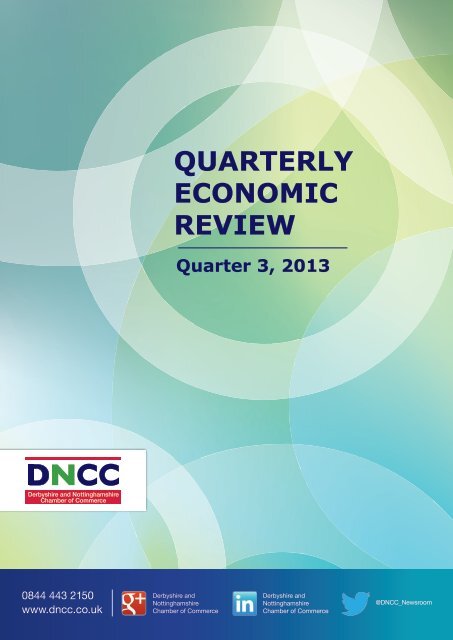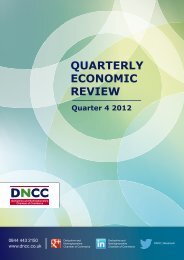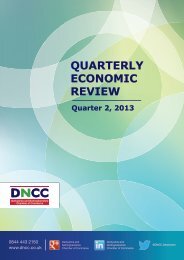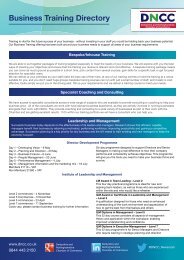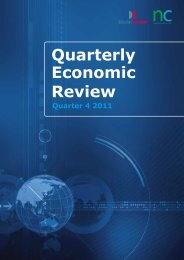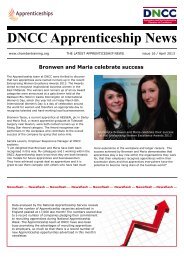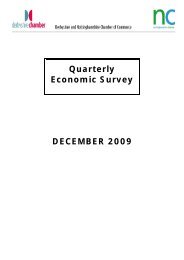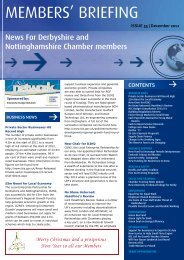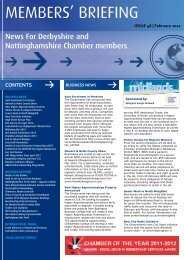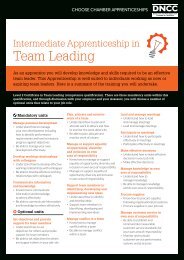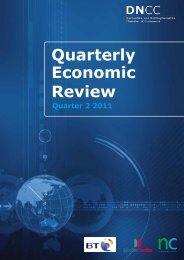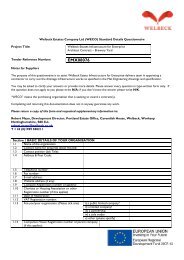quarterly economic review - Derbyshire and Nottinghamshire ...
quarterly economic review - Derbyshire and Nottinghamshire ...
quarterly economic review - Derbyshire and Nottinghamshire ...
Create successful ePaper yourself
Turn your PDF publications into a flip-book with our unique Google optimized e-Paper software.
About DNCC:<strong>Derbyshire</strong> <strong>and</strong> <strong>Nottinghamshire</strong> Chamber of Commerce (DNCC) is the UK’s second largest Chamber of Commerce.It has more than 3,200 members <strong>and</strong> 8,000 affiliates <strong>and</strong> helps businesses to connect, export, influence, recruit, exp<strong>and</strong>,develop, prosper <strong>and</strong> grow.As the largest business organisation in the East Midl<strong>and</strong>s, no other business support group can match the size, scale or voiceof DNCC. The Chamber helps its members to save money; raise their profile; access funding <strong>and</strong> tender opportunities; exp<strong>and</strong>their horizons through exporting; recruit <strong>and</strong> develop their workforce; <strong>and</strong> meet new customers, suppliers <strong>and</strong> trading partners.To find out more about how being a member of the Chamber can benefit your business, email membership@dncc.co.uk orvisit www.dncc.co.uk.About this report:This report sets out the findings of DNCC’s Quarterly Economic Survey (QES) for Q3 2013.The QES is the region’s largest regular business survey, which provides <strong>and</strong> accurate benchmark of business <strong>and</strong> <strong>economic</strong>conditions in <strong>Derbyshire</strong> <strong>and</strong> <strong>Nottinghamshire</strong> on a <strong>quarterly</strong> basis.These regional results are fed into a national survey by the British Chambers of Commerce, which is the UK’s biggest <strong>and</strong>longest-running private business survey <strong>and</strong>:• has provided consistent business <strong>and</strong> <strong>economic</strong> data since 1989• is a leading indicator of business confidence, often picking up big changes in the economy long before other surveys orofficial statistics• the Bank of Engl<strong>and</strong>’s Monetary Policy Committee uses the QES as one of its key benchmarks when setting interest rates.• HM Treasury <strong>and</strong> the independent Office for Budget Responsibility use the QES to put together their forecasts for the UK’s<strong>economic</strong> performance• the European Commission uses the QES to assess the health of the UK economy when it makes policy recommendationsfor both Westminster <strong>and</strong> Brussels• the Organisation for Economic Cooperation <strong>and</strong> Development (OECD) <strong>and</strong> the International Monetary Fund (IMF) use theQES when comparing the UK to competitors worldwideFieldwork for the Q3 survey took place online in August <strong>and</strong> September. There were 361respondents to the survey, 206 from<strong>Derbyshire</strong> <strong>and</strong> 155 from <strong>Nottinghamshire</strong>. 138 were manufacturers <strong>and</strong> 223 were service sector companies.For more information about the survey contact Chris Hobson,Head of Information <strong>and</strong> Representation on 01246 207 207or email chris.hobson@dncc.co.uk2 Quarterly Economic Review | For more information call 01246 212 533
QUARTERLY ECONOMIC REVIEW - Q3, 2013The strong growth recorded in Quarter 2 was repeated in the third quarter as local businesses continued to build on strong UKsales <strong>and</strong> easing cash flows, according to the results of the region’s largest regular independent business survey.DNCC’s latest Quarterly Economic Survey (QES), which tracks business performance across a range of <strong>economic</strong>indicators to produce a <strong>quarterly</strong> “State of the Economy Index”, showed a continued increase in business confidence in thequarter. Following a rise of 74 points in Q2, the index rose a further 139 points in Q3 to reach 354 – the highest level sincemeasurements began six years ago.State of the Economy Index4003002001000-100Q32007Q42007Q12008Q22008Q32008Q42008Q12009Q22009Q32009Q42009Q12010Q22010Q32010Q42010Q12011Q22011Q32011Q42011Q12012Q22012Q32012Q42012Q12013Q22013Q32013-200-300Sales <strong>and</strong> OrdersHalf of (49 per cent) of respondents reported a Q3 increase in UK sales, with only one in 10 saying this had dropped. A further45 per cent of <strong>Derbyshire</strong> <strong>and</strong> <strong>Nottinghamshire</strong> businesses said that UK orders had also increased this quarter.The buoyancy continued into overseas markets, with 28 per cent of businesses reporting that sales for the quarter hadincreased <strong>and</strong> one in four (26 per cent) citing an increase in orders. The markets for business outside of the European Union wasseen as being slightly more positive than those within the EU, with 28 per cent of respondents reporting these as being the mostpositive, compared to 17 per cent for within the EU.DNCC’s International Trade team processed export documentation for goods <strong>and</strong> services worth more than £116m in Q3, withRussia, Turkey <strong>and</strong> the United Arab Emirates identified as the top three destinations.Companies responding to the QES, meanwhile, highlighted Australia, India <strong>and</strong> the USA as strong export markets.Business Confidence <strong>and</strong> Economic OutlookLooking ahead, business confidence in both profitability<strong>and</strong> turnover over the next 12 months jumped, with a net 53per cent of respondents expecting profits to rise over thefollowing year <strong>and</strong> a net 63 per cent predicting an increase inturnover.Four out of 10 respondents said they were currently operatingat full capacity – up from almost one in three (28 per cent) inthe previous quarter:<strong>Derbyshire</strong> <strong>and</strong><strong>Nottinghamshire</strong>Chamber of Commerce<strong>Derbyshire</strong> <strong>and</strong><strong>Nottinghamshire</strong>Chamber of Commerce@DNCC_Newsroom3
Reflecting the overall rise in confidence for the comingperiod, by far the greatest growing concern to businessescomes from increased competition (55 per cent), withrespondents also citing inflation (29 per cent), exchange rates(26 per cent) <strong>and</strong> business rates (21 per cent) as being moreof a concern now than three months ago:Some 26 per cent of respondents anticipated an increase intheir prices over the next quarter, with two-thirds (66 per cent)citing raw material costs as their biggest price pressure:Cash Flow <strong>and</strong> Investment IntentionsSupporting this rise in business confidence is the continuedimprovement in the provision of working capital to assistgrowing businesses, with 30 per cent of respondents sayingthis had improved over the past quarter.As a result more businesses are now starting to revise theirinvestment plans, with 31 per cent planning on greaterinvestment in plant <strong>and</strong> machinery equipment (up from19 per cent in Q2) <strong>and</strong> 27 per cent planning investment instaff development <strong>and</strong> training (up from 23 per cent in Q2),although for the majority the plans remain unchanged at thispoint in the year:4 Quarterly Economic Review | For more information call 01246 212 533
Focus on InfrastructureAs part of the QES, DNCC looks in more detail at specific themes being discussed at member meetings. This supports thedevelopment of DNCC policy activity <strong>and</strong> informs engagement with key local <strong>and</strong> national decision makers.In Q3, the survey explored the infrastructure priorities for business in <strong>Derbyshire</strong> <strong>and</strong> <strong>Nottinghamshire</strong>. Responses weregrouped into the following eight broad categories, listed in order of importance to respondents:• internet connectivity: listed as top issue for 56 per cent; cited by 45 per cent of all respondents• road connectivity: listed as top issue for 25 per cent; cited by 27 per cent of all respondents• rail connectivity: listed as top issue for five per cent; cited by 11 per cent of all respondents• improved public transport: listed as top issue for five per cent; cited by six per cent of all respondents• air connectivity: listed as a top issue for three per cent of businesses <strong>and</strong> cited as an issue by a further three per cent• increased housing supply: listed as top issue for three per cent; cited by three per cent of all respondents• improvements to existing buildings: listed as top issue for three per cent; cited by two per cent of all respondents• associated energy costs: listed as top issue for less than one per cent, but cited by four per cent of all respondentsIncreased internet connectivity <strong>and</strong> speed was by far themost popular issue, with a number of respondents specificallytalking about the importance of superfast broadb<strong>and</strong> to thedevelopment of the rural economy.Road connectivity came in as the second most cited issue,with individual businesses highlighting the importanceof the completion of the ongoing widening of the A453,developing the A1 into a motorway <strong>and</strong> reducing congestionaround key junctions on the M1. A number of respondentsalso highlighted the significance of improving the smallerroads connecting the smaller hubs within <strong>Derbyshire</strong> <strong>and</strong><strong>Nottinghamshire</strong> to reduce travel times <strong>and</strong> improve links intothe larger transport network.Rail connectivity was the third most cited infrastructure issue,although respondents disagreed on whether investmentshould best focus on local rail travel or HS2 investment.Many businesses, however, did highlight the importance ofinvestment in both areas.Among the other issues raised, respondents drew attentionto the value of improvements to public transport withinDerby <strong>and</strong> Nottingham, with several referencing plans forthe Nottingham Tram network beyond lines 2 <strong>and</strong> 3. Theimportance of developing the region’s air connectivity wasalso raised, with the benefits to business of creating aninternational gateway for the Midl<strong>and</strong>s, potentially reducingreliance on other air hubs, being identified.DNCC will be exploring these issues further with membersthrough its policy <strong>and</strong> representation work, ensuring it is ableto best promote the right investment in infrastructure to bestbenefit <strong>Derbyshire</strong> <strong>and</strong> <strong>Nottinghamshire</strong> businesses.6 Quarterly Economic Review | For more information call 01246 212 533
<strong>Derbyshire</strong> <strong>and</strong> <strong>Nottinghamshire</strong>Chamber of Commerce0844 443 2150www.dncc.co.uk<strong>Derbyshire</strong> <strong>and</strong><strong>Nottinghamshire</strong>Chamber of Commerce<strong>Derbyshire</strong> <strong>and</strong><strong>Nottinghamshire</strong>Chamber of Commerce@DNCC_Newsroom


